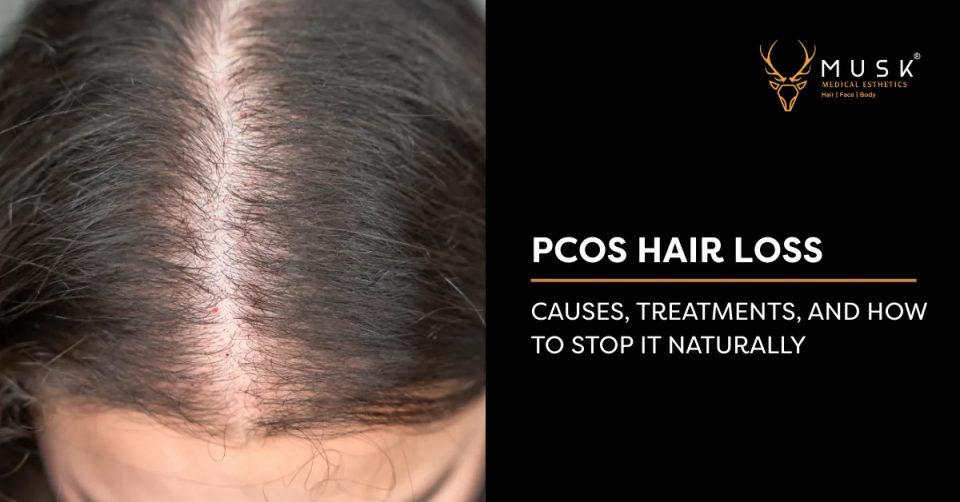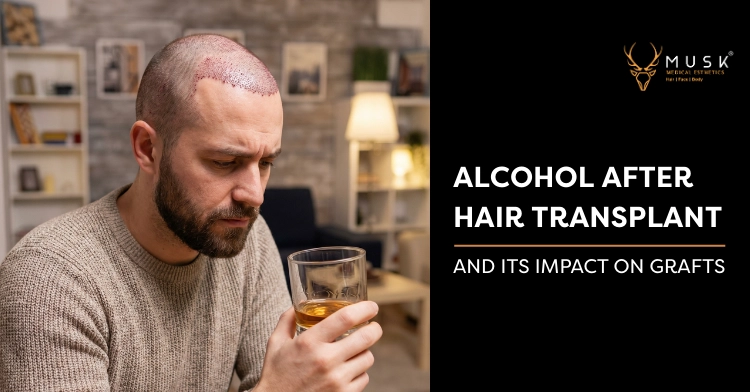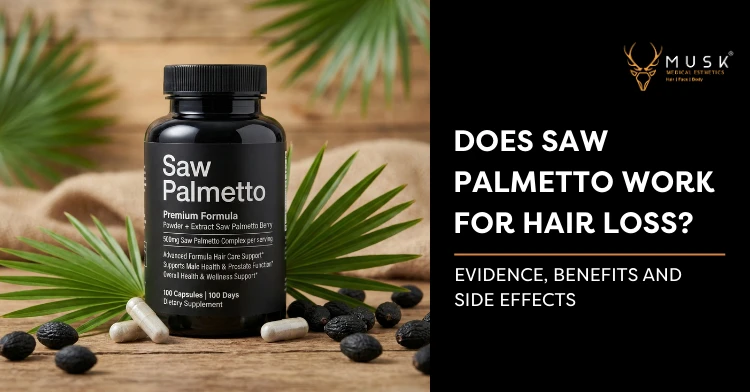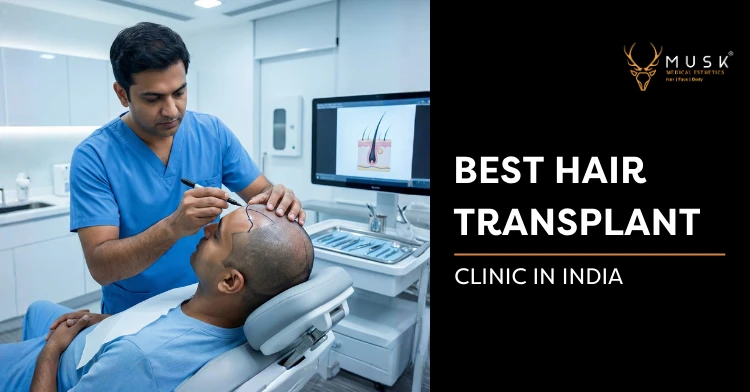PCOS Hair Loss: Causes, Treatments and How to Stop It Naturally

It often starts subtly. An extra strand or two in your hairbrush. You notice a slightly wider parting under the harsh bathroom light. You might dismiss it at first, blaming stress or a new shampoo. But then, the evidence becomes undeniable. Your ponytail feels thinner, your scalp is more visible, and the hair accumulating in the shower drain becomes a source of daily anxiety. For millions of women, this experience isn't just about hair; it's a silent, distressing symptom of Polycystic Ovary Syndrome (PCOS).
This journey can feel isolating, chipping away at your confidence one strand at a time. If this sounds familiar, we want you to hear this loud and clear: You are not alone, and this is not a battle you have to fight by yourself. At Musk Clinic in Ahmedabad, we’ve walked this path with countless women, and we understand the intricate connection between your hormones, your health, and your hair.
This isn't just another article about hair loss. This is your comprehensive roadmap, a deep dive into the science, the solutions, and the strategies that will empower you to reclaim not just your hair, but your confidence, too.
What is PCOS?
PCOS stands for Polycystic Ovary Syndrome.
It is a very common hormonal disorder that affects women of reproductive age. At its core, PCOS is caused by an imbalance of reproductive hormones, which creates problems in the ovaries. This imbalance can prevent the ovaries from releasing eggs regularly or at all.
The condition is typically characterized by having at least two of these three key features:
1)Irregular Menstrual Cycles: This is the most common sign. You might have infrequent periods (fewer than nine a year), very long cycles, or unpredictable periods.
2)Excess Androgens:High levels of hormones often called "male hormones" (like testosterone) in the body. This can cause physical symptoms such as:
- Excess hair growth on the face, chin, or parts of the body where men usually have hair (a condition called hirsutism).
- Severe acne.
- Thinning hair or male-pattern baldness.
3)Irregular Menstrual Cycles: This is the most common sign. You might have infrequent periods (fewer than nine a year), very long cycles, or unpredictable periods.
Because of these hormonal issues, PCOS is one of the most common, but treatable, causes of infertility. It is also associated with other long-term health risks like insulin resistance, type 2 diabetes, and heart disease
Why Is PCOS Targeting Your Hair?
To effectively combat PCOS hair loss, it's crucial to understand the "why" behind it. It all comes down to a hormonal imbalance, specifically involving a group of hormones called androgens. While often labeled "male hormones," androgens like testosterone are present in women, too, playing vital roles. In a woman with PCOS, the body produces an excess of these androgens, which throws the system out of balance and directly impacts the hair growth cycle.
Your hair goes through three phases:
- Anagen (Growth Phase): This is the active phase where your hair grows. It can last for years.
- Catagen (Transitional Phase): A short phase where the hair follicle shrinks.
- Telogen (Resting Phase): The follicle is dormant, and eventually, the hair sheds to make way for a new one.
Excess androgens, particularly a powerful one called Dihydrotestosterone (DHT), disrupt this cycle. They bind to receptors in the hair follicles on your scalp, causing them to shrink in a process called miniaturization. This shortens the anagen (growth) phase, meaning your hair has less time to grow long and strong. Over time, the miniaturized follicles produce finer, weaker, and shorter hairs until, eventually, they may stop producing hair altogether. This specific pattern is known as androgenetic alopecia, or female pattern hair loss
Identifying the Signs: Is It PCOS or Something Else?
Hair loss can stem from various causes, such as stress, nutritional deficiencies, or other medical conditions. So, how can you tell if PCOS is the culprit? PCOS-related hair loss typically has a distinct pattern. While general shedding might occur, the most telling sign is thinning hair concentrated on the top and crown of the head. You might also notice a widening of your center part, often described as a "Christmas tree" pattern.
Unlike male pattern baldness, it rarely leads to a completely bald scalp but rather a diffuse thinning that makes the scalp more visible. Another key indicator is the presence of other PCOS symptoms. Are you experiencing irregular periods, acne (especially along the jawline), unexplained weight gain, or an increase in facial or body hair (hirsutism)? If you're losing hair on your head while gaining it elsewhere, it's a strong signal that hormonal imbalance is the root cause.
Advanced Medical Solutions: Your Hair Treatment at Musk Clinic
While lifestyle changes are fundamental, targeted medical intervention is often necessary to halt hair loss and stimulate significant regrowth. At Musk Clinic, we utilize a combination of diagnostic expertise and advanced technology to create a treatment plan customized specifically to you. We don’t believe in one-size-fits-all solutions; we believe in results.
Here’s a closer look at your potential treatment journey with us:
1. Platelet-Rich Plasma (PRP) Therapy: Awakening Dormant Follicles
PRP therapy is a cornerstone of non-surgical hair restoration. It’s a natural and safe procedure that harnesses your body’s own powerful healing agents to rejuvenate your scalp and hair follicles.
- Who is it for? PRP is ideal for individuals experiencing mild to moderate hair thinning who want to increase hair density, thickness, and strength. It works best when follicles are dormant, not gone.
- The Process at Musk Clinic: Your journey begins with a comfortable blood draw. This sample is then processed in a centrifuge to isolate the golden, platelet-rich plasma. After applying a local anesthetic to your scalp for maximum comfort, our expert practitioner skillfully injects this "liquid gold" into the areas of thinning.
- What to Expect: The entire procedure takes about an hour. You can expect some mild redness or swelling, which typically subsides within a day. A series of treatments, usually spaced a month apart, is recommended for optimal results, with noticeable improvements often appearing within three to six months..
2. Mesotherapy: Direct Follicle Fuel
Mesotherapy is a minimally invasive technique where a specialized cocktail of vitamins, minerals, amino acids, and other active ingredients is delivered directly into the mesoderm (the middle layer of your skin) of the scalp. This targeted approach ensures that essential nutrients go straight to your hair follicles, where they are most needed to combat thinning and revitalize growth.
- Who is it for? Mesotherapy is an excellent option for those experiencing diffuse hair thinning and looking to improve hair quality, reduce hair fall, and stimulate growth. It works wonderfully as a standalone treatment or in conjunction with other therapies like PRP to give follicles a comprehensive nutritional boost.
- The Process at Musk Clinic: After a thorough scalp analysis, our expert practitioner customizes a nutrient-rich solution for your specific needs. Using a series of microinjections with a very fine needle, this solution is meticulously delivered across the thinning areas of your scalp. The procedure is quick, with minimal discomfort.
- What to Expect: A full session of Mesotherapy is fast, often completed in under 30 minutes. You might notice some minor redness on the scalp, which typically resolves within 24 hours. For optimal results, a course of multiple sessions is recommended. Over time, patients report a significant reduction in hair fall, improved hair texture, and noticeable new growth.
3. FUE & ARTAS 9x Robotic Hair Transplant: The Gold Standard for Restoration
For areas where hair thinning has progressed significantly and follicles are no longer active, a hair transplant offers a permanent, life-changing solution. Musk Clinic specializes in the most advanced techniques available today, that is ARTAS 9x Robot.
- Who is it for? A hair transplant is for individuals with more advanced hair loss who have stable donor hair at the back and sides of their head. It’s a definitive solution to restore density in balding areas.
- The Process at Musk Clinic: We use the Follicular Unit Extraction (FUE) method, where individual hair follicles are meticulously harvested from the donor area, leaving no linear scar. For unparalleled precision, we also offer the ARTAS 9x Robotic Hair Transplant. This AI-powered system maps your scalp and identifies the healthiest follicles, harvesting them with robotic accuracy that is impossible to replicate by hand. These healthy follicles are then artistically implanted into the thinning areas, matching the natural angle and direction of your hair growth.
- What to Expect: The procedure is performed under local anesthesia. Recovery is swift, with most clients returning to non-strenuous activities in a couple of days. The transplanted hairs will shed initially and then begin to regrow permanently after 3-4 months, with final, natural-looking results visible in about a year. CTA: Interested in what modern hair restoration can do? See if you're a candidate for PRP, GFC, or ours ARTAS Robotic Transplant. Let's build your custom treatment plan together.
A Holistic Approach: Natural Ways to Support Your Hair Growth
Medical treatments are powerful, but they work best when supported by a lifestyle that nurtures your body and balances your hormones. Think of it as creating the most fertile ground possible for your new hair to grow.
1. Fuel Your Follicles: The Anti-PCOS Diet
Your diet is your first line of defense. Focus on an anti-inflammatory, low-glycemic eating plan to help manage insulin resistance, a common issue in PCOS.
Foods to Embrace:
- Leafy Greens: Spinach, kale, and collards are packed with iron and vitamins.
- Healthy Fats: Avocado, olive oil, nuts, and seeds help regulate hormones.
- Lean Proteins: Chicken, fish, and legumes provide keratin building blocks for hair.
- Antioxidant-Rich Fruits: Berries, oranges, and bell peppers fight oxidative stress.
Foods to Limit:
- Sugar and Refined Carbs: White bread, pastries, and sugary drinks can spike insulin.
- Processed Foods: These often contain inflammatory ingredients.
- Dairy: For some women, dairy can be an inflammatory trigger.
2. Strategic Supplementation
While not a replacement for a healthy diet, certain supplements can provide targeted support. Always consult your doctor before beginning any new supplement.
- Zinc: Helps to block the formation of DHT.
- Biotin (Vitamin B7): A well-known vitamin for improving hair’s keratin infrastructure.
- Iron: Crucial for preventing hair shedding, especially if you have heavy periods.
- Saw Palmetto: A plant extract that may help block DHT naturally. .
3. Master Your Stress
High cortisol (the stress hormone) levels can disrupt your other hormones and exacerbate hair loss.
- Mindful Moments: Dedicate 5-10 minutes a day to meditation or deep breathing exercises.
- Movement as Medicine: Regular exercise like brisk walking, yoga, or swimming helps lower cortisol and improve insulin sensitivity.
- Prioritize Sleep: Aim for 7-9 hours of quality sleep per night. This is when your body does its most important repair work.
The Emotional Journey: More Than Just Hair
We need to acknowledge that PCOS hair loss is not a matter of vanity. It’s an emotional and psychological battle. It can affect how you see yourself, how you interact with others, and your overall quality of life. Seeking treatment is not just about aesthetics; it’s an act of self-care. It’s about taking back control from a condition that can often make you feel powerless. At Musk Clinic, we provide a safe, supportive, and understanding environment where you can discuss your concerns without judgment.
Your journey is our journey. Restoring your hair is a powerful step toward restoring the vibrant, confident you.
Take the First Step Today
You've read the science, you understand the solutions, and you know that there is a clear path forward. You don't have to spend another day feeling helpless about your hair loss. The expert team at Musk Clinic is here to guide you, support you, and provide you with the most effective, personalized treatments available.
It’s time to stop worrying and start acting. Schedule your confidential consultation at Musk Clinic today. Let's work together to write the next chapter of your story - one with healthy hair and renewed confidence.
Frequently Asked Questions (FAQs)

Dr. Anand B. Shah
- 10 Years of Experience
Dr Anand B. Shah, is a board-certified Maxillofacial & Craniofacial surgeon who is highly skilled in cosmetic facial and hair restoration surgery and has exclusively practised the same, internationally and nationally.











